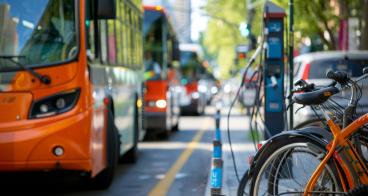European cities paving the way to net zero: How can we get on track for 2050?
With over 70% of global CO2 emissions and 75% of EU citizens concentrated in urban areas, it makes sense to initiate decarbonisation efforts in cities. But with so many challenges to be met, including political, institutional, organisational, technological, infrastructural and socio-economic obstacles, the goal of reaching net zero by 2050 can often feel out of reach. How can cities coordinate to make this vision achievable?
As part of the Horizon Europe programme, the EU has launched the “100 Climate-Neutral and Smart Cities by 2030” Mission, also known as the EU Cities Mission. The objectives of the EU Cities Mission are to achieve climate neutrality in 100 European cities by 2030 and to establish them as innovation hubs to enable all European cities to follow suit by 2050.
NetZeroCities, managing the platform for the EU Cities Mission, supports these cities to put their climate ambitions into action by lending world-class expertise and services tailored to each of their needs. The initiative helps cities overcome the structural, institutional and cultural barriers they might face on the path to net zero.
Running over six years, and involving 34 partners across 13 countries, the main objectives of the project are to:
- Develop a framework to support climate-neutral transformation in cities
- Help cities build capabilities and ways of working to advance systemic change using innovation
- Forge a platform for cities to use for all services and expertise critical to climate neutrality
- Facilitate a network of cities collaborating to achieve climate neutrality
Climate neutral cities must consider how citizens move
Urban mobility accounts for nearly a quarter (23%) of all carbon emissions in European cities, and consequently forms one of the key areas where cities are considering new innovations and solutions to reduce their emissions.
To better understand the mobility barriers faced by Mission Cities, an analysis of Climate City Contracts and Pilot Cities carried out by the NetZeroCities Mobility Domain Working Group found that transport is the second largest barrier faced by Mission Cities — following closely behind cross-sectoral barriers — with private transport and public transport identified as the subsectors being the biggest barriers.
Among the 68 pilot city activities implemented under the Pilot Cities Programme, which focuses on exploring and testing pathways to rapid decarbonisation over a two-year period, more than half include a mobility component. Public transport is a major area of focus, alongside actions aimed at encouraging behavioural change to reduce car dependency and promote the uptake of active mobility and public transport use.
The following case studies, all part of the NetZeroCities Pilot Cities Programme, tackle different aspects of decarbonising mobility, from applications encouraging citizens to use public transport in Slovenia, to projects designed to strengthen cross-sector collaboration in Sweden, and citizen engagement initiatives in Greece.
Mobility as a service application in Kranj, Slovenia
Three cities in Slovenia, Ljubljana, Kranj and Velenje are tackling different but complementary aspects of the green transition: energy retrofitting, sustainable mobility and renewable energy sources.
Kranj is pioneering sustainable mobility by developing a Mobility as a Service (MaaS) application to encourage citizens to utilise public transport and reduce car dependency. In combination with public campaigns, the app will have the capacity to influence behaviour by nudging users to change their mobility behaviour and make more sustainable choices.
By blending technology, community engagement, and a steadfast commitment to environmental stewardship, Slovenia demonstrates that even small nations can lead the way in the global race to climate neutrality.
Strengthening cross-sector collaboration in Gävle, Sweden
In Sweden, Gävle is working to strengthen cross-sector collaboration between the public sector, business, academia, and civil society. Through this ecosystem, Gävle plans to test innovative ways of collaboration towards climate neutrality with the objective of building a foundation for the efficient electrification of large-scale charging infrastructure, primarily targeting road transport.
The pilot builds on previous activities in the city designed to establish a collaboration platform between road transport companies and transport purchasers, with the specific goal of decarbonising the transport sector by fostering a cooperative ecosystem and optimising freight electrification through simulation modelling.
The pilot also integrates insights from previous and current projects including digital platforms showing alternative fossil fuel stations, shared commuting platforms and static charging infrastructure, demonstrating the importance of building on established networks and knowledge systems to accelerate the impact of decarbonising initiatives.
Citizen engagement for a just transition in Athens, Greece
Set in a multicultural neighbourhood in Athens, the ASCEND pilot takes a participatory approach to advancing climate neutrality and enhancing urban liveability. Athens faces challenges with air and noise pollution, energy poverty, and unequal access to urban amenities, particularly in marginalised communities. By actively engaging citizens and other stakeholders, solutions can be tailored to meet the needs of the communities they are designed to serve.
The pilot seeks to mitigate climate change by reducing emissions, promoting sustainable mobility, and enhancing green spaces in economically disadvantaged areas. Through inclusive governance and learning mechanisms, the pilot activity will implement a number of sustainable mobility measures including the introduction of the superblocks model to promote sustainable transport, expand cycling paths, and encourage the use of electric vehicles.
The initiative aims to create a resilient and sustainable urban environment, aligning with Athens’ Climate Action Plan by transforming the neighbourhood, engaging the community and setting a precedent for more liveable and climate-friendly cities.
The path to climate neutrality in your city starts here!
While each of these cities is tackling very different challenges relating to urban mobility, all three pilot studies contribute to a bigger picture of the reality of the work required to achieve net zero. Cross-sector collaboration, smart use of technology and innovation, citizen engagement and learning from other cities are all essential aspects of the success of this mission.
These pilots, among the 112 cities participating in the EU Cities Mission, offer valuable insights to guide other cities and support the progress of the EU Cities Mission to achieve climate neutrality in 100 European cities by 2030.
Another Horizon Europe project committed to advancing the EU’s climate-neutral mission, UPPER (Unleashing the Potential of Public Transport in Europe) is now open to applications from cities interested in joining a Replication Programme to learn from 10 Living Labs.
UPPER aims to strengthen the role of public transport as the cornerstone of sustainable and innovative mobility. The living labs in Valencia, Rome, Versailles Grand Parc – Île de France, Oslo, Mannheim, Lisbon, Leuven, Budapest, Thessaloniki and Hannover region are implementing measures to push people away from private car use and to pull them closer to public transport. Learn more about the programme and how you could learn more from these cities to boost public transport use here.
There are also hundreds of products available for you to browse on the Mobility Innovation Marketplace that can help advance your city on the path towards net-zero, from MaaS solutions similar to those implemented in Kranj, to software and products designed to support electrification of transport in alignment with the priorities Gävle, and community engagement tools to boost public participation – the cornerstone of Athens’ approach.
Though we are still far from meeting the emission reduction targets required to turn the tide on climate change, the collective impact of steps taken by cities to decarbonise should not be underestimated. As the NetZeroCities pilots demonstrate, change doesn’t happen overnight, it happens incrementally and steadily when we work together towards a common goal, building on existing momentum, sharing insights and learning from one another in the process.
Join the movement and help shape the future of safe and sustainable cities for all, beginning with the biggest factor driving carbon emissions in cities: mobility, transport and how citizens move.






